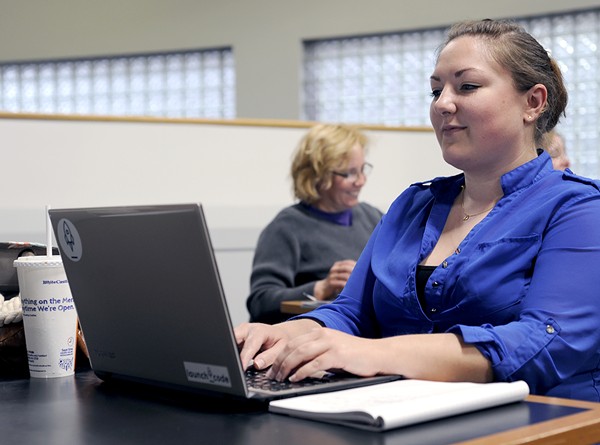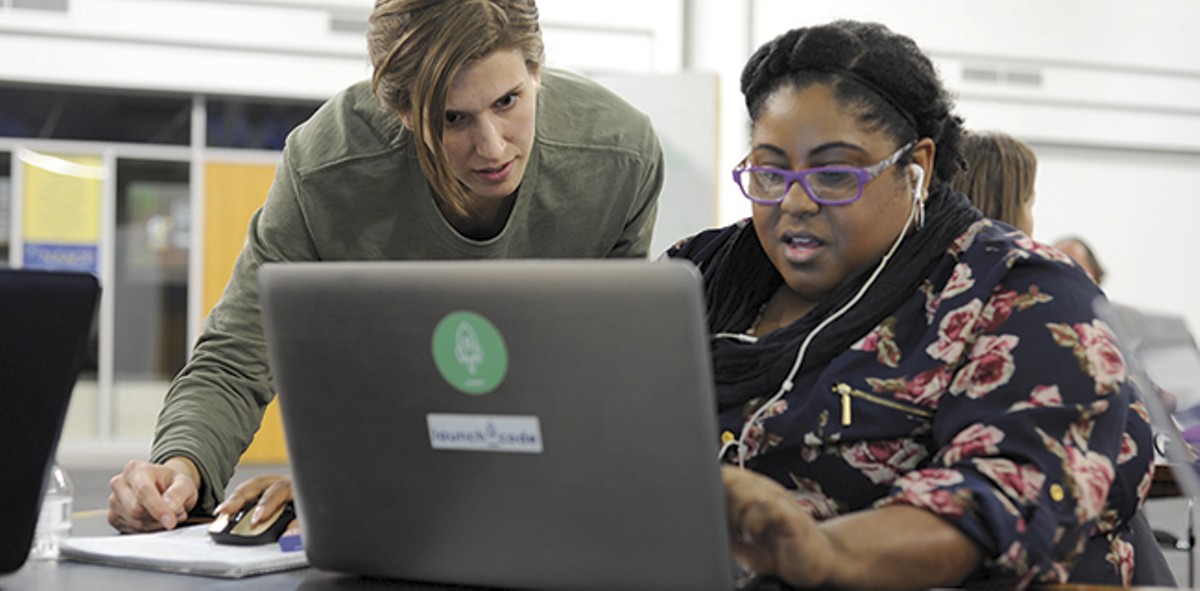The culture is what kills, many women in tech say. And a startling experience is the knife.
"I don't even know who he was, but he was stopping by to talk to one of the guys I knew really well in the next cubicle," Katie Mathews remembers with a grimace. "I was grabbing some cashews from my friend's desk, and he was like, 'Oh, you like John's nuts?' and kept saying it. And the guy who was my friend and sitting right there just did not do a thing."
Mathews, then a software engineer at a large St. Louis aerospace corporation, was stunned by the visitor's innuendo-laden "joke," she says. For a newer employee at her first post-college job, the innuendo was a jarring wake-up call as to what it would be like working in an office, in a company and in an industry that predominantly employs men.
But she was just as shocked at her friend's silence.
"I didn't react. I should've said something," Mathews reflects. "But he was aware of that and he didn't say anything. He didn't stand up for me or say, 'Hey that's not cool.' He just apologized that it happened to me afterwards."
Mathews' experience isn't an isolated case, and, sadly, it's not the worst. Dealing with everything from gender-biased hiring practices to sexual assault to skepticism about their abilities, women in male-dominated workplaces often have to fight for both their livelihoods and their lives. But in tech-focused disciplines like engineering and programming, the problem has become especially pronounced.
According to figures released in March 2017 by the National Center for Women & Information Technology, women made up only 26 percent of the computing workforce in 2016. Even worse, women who were not white held only ten percent of those jobs in the same year, with black women at three percent, Asian women at five percent and Hispanic women at two percent.
With figures like those, women are easily outnumbered by men when building an app or coding a company's sales systems. And when those men — who usually are heterosexual and white — occupy most of both the leadership and worker-bee positions, the culture often becomes hostile to women, inadvertently or not.
Pool tables, basketball hoops, Nerf guns and video games are among the office comforts you'll find in startups in Silicon Valley and, yes, St. Louis. Meanwhile, restrooms often are missing basics like tampons or even soap. Clients assume that women are office managers instead of lead programmers. A pregnancy announcement becomes a minefield, with possibilities like no family leave policy, loss of investors or a perception that pregnant employees don't work hard enough all looming on the horizon.
And, as the news has shown us recently, the "bro" atmosphere can go well beyond office gadgets and basic inequality.
In 2015, engineer Kelly Ellis alleged through a tweetstorm and in subsequent news stories that executives at Google, her previous employer, had behaved inappropriately and cultivated a "boy's club" culture. She said that her reports to HR were dismissed.
And earlier this year, Susan Fowler, an engineer who had worked at ride-sharing behemoth Uber, leveled multiple allegations of sexual harassment against her former company, disclosing that male employees regularly sent her lewd messages and requests for sex. She also said that her supervisors retaliated against her with bad performance reviews after she had repeatedly told human resources about the incidents. Since Fowler made her allegations public, additional women have come forward with their own stories about Uber.
If women are only going to be distrusted, marginalized and harassed like this, why would they even want to go into the tech industry in the first place?

Uh, they don't.
A National Center for Women & Information Technology study shows that only 23 percent of the high school students who took the AP Computer Science test in 2016 were women. It's the same story at the college level where, in 2015, 16 percent of the computer science bachelor's degree recipients at major research universities were women; in contrast, that figure was 37 percent in 1985.
Can the trend be reversed? Could an influx of kick-ass professional women change the unbalanced, often-toxic coder culture? And if so, how will those women find their way into tech leadership positions or even to the industry at all, since younger women are showing their aversion?
One of the answers may lie with programs like CoderGirl, an initiative from the St. Louis nonprofit LaunchCode that's determined to address the gender gap in tech and create a pipeline of talented female programmers. Through CoderGirl's year-long program, participants of all ages, backgrounds and income levels learn essential coding skills while working on projects in a non-toxic, collaborative, woman-friendly environment. Women who successfully complete CoderGirl training may apply for LaunchCode apprenticeships with local big-name companies or explore other opportunities for full-time work in programming.
"It gives women the opportunity to just jump in right away, rather than having to work through that uncomfortableness," CoderGirl director Crystal Martin says of the program's inclusive female-friendly space. "It's enough to get women to take that first step, get them in the door and to a place where they can thrive."
The initiative seems to be working so far; since 2014, more than 600 CoderGirls have completed the program. (Worth noting: 58 percent of the 165 women in the current cycle are women of color.) At least 56 women who have completed the CoderGirl program have since moved into tech employment. A recent reimagining of the program from a casual meetup format to a more formal class structure portends continued growth and job placements.
And mentors are a huge part of CoderGirl's success. Six previous CoderGirl participants have returned to the program as mentors on a consistent basis, with a few others dropping by to help when their schedules allow. As professional women with expertise in specific programming languages and skills, CoderGirl's mentors work one-on-one with participants to not only teach, but also to directly empower.
"It's not just about getting women jobs in tech; it's also about building a network and a workforce of women who can support each other in whatever situations they're in," says Martin. "On a larger scale, programs like CoderGirl can have an impact."
Mathews, who now serves as a CoderGirl mentor, says that she often discusses with her mentees the gender- and identity-based hardships that await in some tech environments. She notes that CoderGirl's speaker series brings in female industry leaders and provides a framework for mentors to have honest discussions with learners in a comfortable environment.
"I don't think we explicitly make a point to talk about it, but because you come there after your work day, you bring those experiences and debrief with people. I'm very open and vulnerable about my experiences," Mathews says. "I think everyone in the space is learning from everyone's experiences on that.
"I think it's the multiplier effect: The more it's all talked about, the more women you meet, the more you support women. It should just blossom," continues Mathews. "Thinking of those male-dominated cultures, the only way to take them down is infiltrate; if you keep bringing women along with you, eventually something will have to change."






